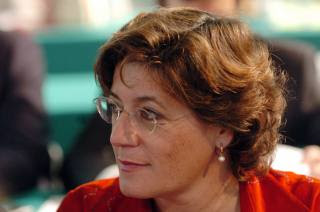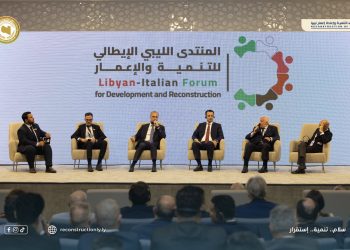By George Grant.
Tripoli, 17 June:

The European Parliament’s standing rapporteur for Libya, Ana Gomes MEP, has spoken of her “incredible optimism” for . . .[restrict]the future of Libya, as the country heads towards its first nationwide democratic elections next month.
Gomes, who has been visiting Libya regularly since her appointment in June 2010, has said that she sees “progress in every field” of Libyan life, in particular the reduced number of weapons on Libyan streets, the widespread reopening of schools and businesses, and the country’s success in overcoming the logistical challenges of preparing for the 7 July elections.
The parliamentarian’s assessment stands in stark contrast with those of many external observers of Libyan affairs, who frequently speak of a country descending into chaos.
Speaking during her latest visit to Tripoli today, Gomes drew on the experience of her native Portugal, as well as that of Indonesia, to conclude that Libya’s difficulties in transitioning from dictatorship to democracy could be overcome. “I lived under a dictatorship for the first 21 years of my life”, she said. “We went into a transition, which was a very messy process that took time. The same can be said of Indonesia, where I was Portuguese ambassador between 1999 to 2003. What we are seeing in Libya is not much different. I think I understand the difficulties, but I can also see the progress”.
One day after the United Nations (UN) suspended its mission to Syria amidst escalating violence, Gomes also warned that unduly negative perceptions of the situation in Libya were making it more difficult to broker a resolution to the crisis there. “Russia is bashing Libya as an excuse not to act on Syria”, she said. “The Russian deputy foreign minister [Sergey Riabkov] said to me the other day that we cannot allow ‘another blunder like Libya’. I said ‘what blunder? Overthrowing a dictator?’.”
Gomes warned that Libya’s transition to democracy would be fraught with difficulties and would take considerable time, but said that this should not be used as an excuse to claim the process should never have been started. “Nobody is born knowing how to live in a democracy”, she insisted. “It is something that comes through learning and doing. I can tell you this through the experience of my own people. To arrive at democracy, everyone has to start somewhere.”
Asked if she thought a democratically elected government would be better placed than Libya’s transitional authorities to restore stability to the country, Gomes said it was an essential precondition. “I don’t think the elections will improve the militia situation overnight. Libya needs to get a government in place and then put together a framework for action. However, it is an essential precondition for success that Libyans have a government that feels empowered and in a legitimate position to take the tough decisions and reassert a monopoly on power.”
Gomes said she was encouraged by the recent findings of Libya’s Warriors Affairs committee, that 70 per cent of the more-than 200,000 militiamen surveyed declared a desire to return to civilian life, with the remaining 30 per cent declaring their ambition to join the army or police. “What this also demonstrates, however, is how important it will be for the new government to focus on job creation, as well as training and providing the necessary time and resources”.
Gomes also emphasised the international community’s role in this regard, in particular that of democratic countries. “People in Libya are really asking us to assist them”, she said. “We have the obligation, but also the interest, to support Libya’s transition to democracy. We have a role to play in job creation, civil society development, education and security sector reform. We also want to support the development of Libya’s political structures, for instance in terms of organising debates, agendas and so forth, if the Libyans request it. That is why the EU office is now being enlarged; we are drawing in people with experience of democratic transitions”.
One area that Gomes said required particularly urgent attention was justice and reconciliation. “This is a priority”, she said. “I know the heritage Libyans are saddled with is terrible. Qaddafi’s power was based on divide and rule, so he was pitting communities against each other, which is resulting in many of the local conflicts we are now seeing. Libyans are having many conflicts with terrible violence, but they need to understand that it’s time to move on from that state of mind.”
Having recently returned from the detainment facility at Janzour, where some 2,000 predominantly Tawerghan prisoners are being held, Gomes highlighted the ongoing recriminations between Misurata and Tawergha as a particular concern. “The conditions in Janzour are terrible. They have almost no water; they are squatting; and they don’t have any perspective about their situation. Health there is terrible. I saw one prisoner with a terrible injury to his leg, who has received no treatment since he arrived at the facility”.
Hostility between the predominantly black African population of Tawergha and the predominantly Arab population of nearby Misrata extends back many years. During last year’s conflict Qaddafi armed the Tawerghans, who Misratans accuse of commiting horrendous crimes during the subsequent siege of the city, including widespread murder, looting and rape. Since the end of the revolution Misratans have exacted collective punishment, forcing almost all of the 30,000 occupants of Tawergha to flee. Many thousands are now being held in detention centres in and around Misrata and elsewhere in Libya, including Janzour on the outskirts of Tripoli.
“In order to have reconciliation, there must first be justice, and justice requires proper investigations to establish the truth”, Gomes said. “We [the international community] need to put our expertise to talking to both sides; listening to both sides; and preparing them psychologically for dialogue. I do think that people are getting themselves ready for that, but Libya’s leaders will need to set up a proper framework to implement this process.
“Laws by themselves will do nothing. You need to implement the laws, and for that you need a functioning justice system. Without it the future of Libya will be at stake.
“Fortunately, we do not need to reinvent the wheel here. We have other examples to draw on, such as South Africa after apartheid, or Cambodia after the Khmer Rouge. It can be done.”
In addition to establishing a proper truth and reconciliation process, Ghomes also said that priority must also be given to beginning trials of the most serious criminals, and to ensure such trials are free and fair. “The most important of these will obviously be that of Saif Al-Islam Qaddafi”, she said. “I do not believe that the Libyans will give him an unfair trial; they don’t want the world accusing them of that, although they may need to request international help to ensure it’s done properly”.
Commenting on the case of the detained International Criminal Court (ICC) lawyer Melinda Taylor, Gomes also warned of its potential to worsen international perceptions of Libya. “I do understand the sensitivities that Libyans have [about this situation], but this case is giving a terrible press to Libya in the outside world. I can only hope that the matter can be sorted out diplomatically and quickly”.
Gomes concluded by offering her congratulations to Libya’s deputy prime minister, Mustafa Abushagur, on the visit he made to the foreign affairs committee of the European Parliament of 15 May. “He gave a very full and frank assessment of the situation in Libya, both its challenges, but also its progress”, she said. “The committee members were very impressed with him, and I can only hope his assessment went some way to countering negative perceptions, in the parliament at least”. [/restrict]







